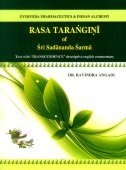Taranga, Taraṃga, Taraṅga, Tāraṅga, Taramga: 26 definitions
Introduction:
Taranga means something in Hinduism, Sanskrit, Jainism, Prakrit, Buddhism, Pali, the history of ancient India, Marathi, Hindi. If you want to know the exact meaning, history, etymology or English translation of this term then check out the descriptions on this page. Add your comment or reference to a book if you want to contribute to this summary article.
Taranga has 25 English definitions available.
Languages of India and abroad
Sanskrit dictionary
[Deutsch Wörterbuch]
Source: Cologne Digital Sanskrit Dictionaries: Böhtlingk and Roth Grosses Petersburger WörterbuchTaraṃga (तरंग):—(taram, absol. von 1. tar, + 1. ga) [Uṇādisūtra 1, 119.] m. [Siddhāntakaumudī 250], a, [4.]
1) Welle [Amarakoṣa 1, 2, 3, 5.] [Hemacandra’s Abhidhānacintāmaṇi 1075.] [UJJVALAD.] zu [Uṇādisūtra] [Rāmāyaṇa 4, 41, 29. fgg.] [Suśruta 1, 91, 14.] [Bhartṛhari 1, 80.] [Śākuntala 55.] [Pañcatantra 263, 20.] [Varāhamihira’s Bṛhajjātaka S. 12, 12.] [Gedicht vom Vogel Cātaka 9.] [Prabodhacandrodaja 21, 4.] Am Ende eines adj. comp. f. ā [Pañcatantra 188, 11.] —
2) Welle als Bez. von Unterabtheilungen oder Abschnitten, insbes. solcher Werke, welche im Titel ein Wort wie Meer oder Fluss enthalten; so z. B. im Kathāsaritsāgara und in der Rājataraṃgiṇī; vgl. [Weber’s Verzeichniss No. 1378.] [Oxforder Handschriften 101],b. —
3) eine springende Bewegung, Galopp, = turagādīnāmutphālaḥ [UJJVAL.] nayanakuraṅga [Gītagovinda 12, 20.] das Wogen, sich-Hinundherbewegen: bhrū (vgl. apāṅgataraṃgitāni [Gītagovinda 3, 13] und tarala) [Harivaṃśa 4298.] —
4) Zeug, Kleid [UJJVAL.] — Vgl. 2. uttaraṃga, carma .
--- OR ---
Taraṃga (तरंग):—
1) sataraṃgā taraṃgiṇī [Kathāsaritsāgara 72, 343.]
Source: Cologne Digital Sanskrit Dictionaries: Sanskrit-Wörterbuch in kürzerer FassungTaraṃga (तरंग):—m. (adj. Comp. f. ā) —
1) Welle , Woge. —
2) Welle als Bez. von Unterabtheilungen oder Abschnitten , insbes. solcher Werke , die im Titel ein Wort wie Meer oder Fluss enthalten. —
3) springende Bewegung , Galopp. —
4) das Wogen , Sichhinundherbewegen. abhra (v.l. bhrū) [Harivaṃśa 2,24,26.] —
5) *Zeug , Gewand.
Sanskrit, also spelled संस्कृतम् (saṃskṛtam), is an ancient language of India commonly seen as the grandmother of the Indo-European language family (even English!). Closely allied with Prakrit and Pali, Sanskrit is more exhaustive in both grammar and terms and has the most extensive collection of literature in the world, greatly surpassing its sister-languages Greek and Latin.
See also (Relevant definitions)
Starts with: Taramgabha, Taramgalola, Taramgavada, Tarangaka, Tarangali, Tarangamalin, Tarangamay, Tarangamaya, Tarangana, Taranganem, Tarangarupa, Tarangasancarana, Tarangasanchaaran, Tarangavati, Tarangavinem, Tarangayit.
Ends with (+33): Adbhutaranga, Akashataramga, Amritataranga, Antaranga, Anuttaranga, Ardramtaramga, Ataranga, Bhukampiya-taranga, Bulbultaramga, Carmataranga, Carmmataranga, Chandastaranga, Charmataranga, Charmmataranga, Chhandastaranga, Cittaranga, Damtaramga, Itaranga, Jalataranga, Jataramga.
Full-text (+125): Tarangita, Naditaranga, Jalataranga, Carmataramga, Carmataranga, Uttaranga, Taramgu, Yogataramga, Carmmataranga, Naritarangaka, Tvaktaramgaka, Mahimataramga, Taramgaka, Uttaramgi, Samutphala, Prashastitaramga, Shabdataramga, Mahimataramgatika, Varitaramga, Nititaramga.
Relevant text
Search found 36 books and stories containing Taranga, Taraṃga, Taraṅga, Tāraṅga, Taramga, Tarāṅga, Tāraṃga; (plurals include: Tarangas, Taraṃgas, Taraṅgas, Tāraṅgas, Taramgas, Tarāṅgas, Tāraṃgas). You can also click to the full overview containing English textual excerpts. Below are direct links for the most relevant articles:
Chaitanya Bhagavata (by Bhumipati Dāsa)
Verse 3.3.48 < [Chapter 3 - Mahāprabhu’s Deliverance of Sarvabhauma, Exhibition of His Six-armed Form, and Journey to Bengal]
Verse 1.1.61 < [Chapter 1 - Summary of Lord Gaura’s Pastimes]
Verse 3.4.332 < [Chapter 4 - Descriptions of Śrī Acyutānanda’s Pastimes and the Worship of Śrī Mādhavendra]
Brihad Bhagavatamrita (commentary) (by Śrī Śrīmad Bhaktivedānta Nārāyana Gosvāmī Mahārāja)
Verse 2.2.196 < [Chapter 2 - Jñāna (knowledge)]
Verse 2.3.44 < [Chapter 3 - Bhajana (loving service)]
Verse 1.7.107 < [Chapter 7 - Pūrṇa (pinnacle of excellent devotees)]
Reviews < [November 1947]
M. S. Subbulakshmi < [January – March, 2005]
Tyagaraja’s Musical Compositions < [October – December, 1985]
Preceptors of Advaita (by T. M. P. Mahadevan)
(ii) Niśchaladāsa < [56. Some Authors of Works in Regional Languages]
Bhakti-rasamrta-sindhu (by Śrīla Rūpa Gosvāmī)
Verse 4.9.14 < [Part 9 - Incomplete Expression of Mellows (rasābhāsa)]
Verse 3.5.18 < [Part 5 - Conjugal Love (mādhurya-rasa)]
Verse 3.1.8 < [Part 1 - Neutral Love of God (śānta-rasa)]
Sahitya-kaumudi by Baladeva Vidyabhushana (by Gaurapada Dāsa)
Text 4.51 < [Chapter 4 - First-rate Poetry]
Text 10.242 < [Chapter 10 - Ornaments of Meaning]
Related products

